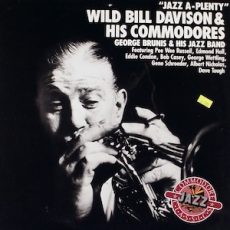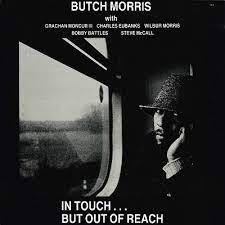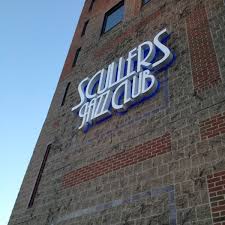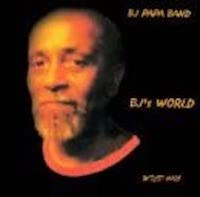
Daily Dose Of Jazz…
Robert Hanley Casey was born in Johnson County, Illinois on February 11, 1909 and learned to play banjo and guitar as a child, playing both in regional ensembles in the Midwest. He didn’t pick up the bass until he was twenty and continued as a guitarist for some time after.
The mid-1930s saw him playing in NBC radio ensembles and working with Wingy Manone. In 1939 Bob joined Muggsy Spanier’s Ragtimers band but the group soon split, after which he played with Charlie Spivak, Brad Gowans, Eddie Condon, Miff Mole, and Joe Marsala. He played extensively on radio with several of these ensembles.
Casey was also a prolific session bassist, recording with Wild Bill Davison, Bobby Hackett, Cliff Jackson, Max Kaminsky, Eddie Edwards, Bud Freeman, Pee Wee Russell, Georg Brunis, George Wettling, Ralph Sutton, Joe Sullivan, and Boyce Brown in the 1940s and 1950s.
Relocating to Florida in 1957, he played with the Dukes of Dixieland. By the 1970s he was playing only occasionally. Double bassist Bob Casey transitioned on April 9, 1986, in Marion, Illinois.
More Posts: bass,history,instrumental,jazz,music

Daily Dose Of Jazz…
Butch Morris was born Lawrence Douglas Morris on February 10, 1947 in Long Beach, California. Before beginning his musical career, he served in the U.S. Army as a medic in Germany, Japan and Vietnam during the Vietnam War. He came to attention with saxophonist David Murray’s groups in the late 1970s and early 1980s.
>Morris led a group called Orchestra SLANG. The group features drummer Kenny Wollesen, alto saxophonist Jonathon Haffner, trumpeter Kirk Knuffke and others. He performed and presented regularly as part of the Festival of New Trumpet Music, held annually in New York City. He wrote most of the incidental music for the 1989 TV show, A Man Called Hawk, which starred Avery Brooks, with whom he co-wrote the theme music, along with Stanley Clarke. He also played with well-known artist and would-be drummer A.R. Penck in 1990.
The originator of Conduction (a term borrowed from physics), a type of structured free improvisation where Butch directs and conducts an improvising ensemble with a series of hand and baton gestures.
Cornetist, composer and conductor Butch Morris, known for pioneering his structural improvisation method Conduction, transitioned from lung cancer on January 29, 2013, at the age of 65 in New York City.
More Posts: bandleader,composer,conductor,cornet,history,instrumental,jazz,music

The Jazz Voyager
Coming off a fantastic performance by Cecilé McLorin Salvant in Miami, The Jazz Voyager is heading out of the South and up the East Coast for colder temperatures in Beantown to hang out at Scullers Jazz Club, and catch a pianist I haven’t seen in more than two decades. I was extremely impressed by his talent and his name is Loston Harris. As usual, after a relaxed dinner, I’ll be catching the second set which for me is the best.
After meeting Harry Connick, Jr. at the 1st Thelonious Monk Jazz Competition in Washington, DC, Connick led Loston to study with his mentor, Ellis Marsalis, who encouraged him to switch from drums to piano. The rest, as they say, is history. Blending jazz, gospel and blues with his own unique styling, Harris takes the Great American Songbook to new heights. He has toured and performed with numerous Grammy Award and Pulitzer winner Wynton Marsalis, and appeared in the PBS special Portraits in Blue with Grammy nominated pianist Marcus Roberts.
Since 1989 Scullers has presented the biggest names in straight ahead,Latin and Contemporary jazz along with blues, soul, r&b, and world music. It swet a new standard for jazz clubs in Boston with a world-class roster of renowned jazz artists.The club is located at 400 Soldiers Field Road, Boston, Massachusetts 02134. In the area or flying in and have the time, support jazz and hear a phenomenal musician and vocalist.
Sculler’s number is 617-747-2261. If you want to get more information visit https://notoriousjazz.com/event/loston-harris.
More Posts: adventure,album,club,festival,genius,jazz,museum,music,piano,preserving,restaurant,travel,vocal

Daily Dose Of Jazz…
B.J. Papa was born on February 9, 1936 in Mobile, Alabama and as a child in the 1940s he was listening to all kinds of jazz and blues on the radio. Drafted into the Army in 1954 he became a medic and was stationed in San Francisco, California at Letterman Hospital in the Presidio. However, he ended up spending much of his service time playing on Army ball teams. By the time he turned 19 he found himself intrigued with the jazz bands booked into the Army noncommissioned officers clubs.
After his discharge from the service in 1956 Papa stayed in town and began saxophone lessons. He also made his first forays into the heart of the bustling Fillmore Street jazz community and would show up to listen and learn at the famous after-hours jams at Jimbo’s Bop City.
Over the course of his fifty year career Papa became a North Beach institution mentoring dozens of young cats making their transition from student to professional musician. He played with the biggest names in jazz to come through the city as well as passionate laymen sans pedigree.
Settling in at Jazz At Pearl’s, one of the few remaining jazz clubs that still possessed an air of authenticity before closing its doors, for thirteen years he shared the stage with an eclectic, enthusiastic audience nightly.
Pianist B.J. Papa, who always fed on and drew from the energy of the audience but has no recordings on line, transitioned on August 31, 2008.
More Posts: bandleader,history,instrumental,jazz,music,piano

Daily Dose Of Jazz…
William Crickett Smith was born on February 8, 1881 in Emporia, Kansas, the child of Tennessee Exodusters. His professional career began in childhood, performing in Nathaniel Clark Smith’s Picaninny Band before moving into minstrel troupes, vaudeville and cabaret.
In 1913-1914, he made several early recordings with James Reese Europe’s group, the Clef Club Society Orchestra. Between 1914 and 1919, he performed in the Ford Dabney Orchestra, the resident band at Florenz Ziegfeld’s Broadway cabaret, Midnight Frolics. Between 1917-1919, they produced several dozen phonographs.
By 1919 Smith had relocated to Paris, France playing with Louis Mitchell’s Jazz Kings until 1924. The group recorded for Pathe Records. He became the leader of Mitchell’s group in 1923. He went on to tour France, Spain and Russia with his own bands from 1925 to 1933. However, during the Depression, he spent nine years in Southeast Asia, working with Herb Flemming, Leon Abbey, and Teddy Weatherford, mostly in Bombay and Batavia. In 1936, he recorded with a group called the Symphonians.
Around 1943 cornetist and trumpeter Crickett Smith, who played jazz blues and ragtime, returned to New York City and the following year transitioned on August 30, 1944.
More Posts: bandleader,cornet,history,instrumental,jazz,music,trumpet



